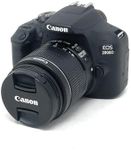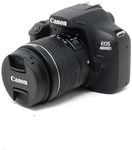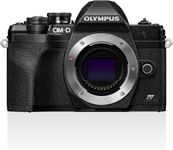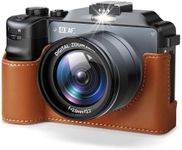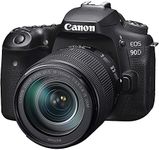Buying Guide for the Best Beginner Dslr Cameras
Choosing a beginner DSLR camera can be an exciting journey into the world of photography. As a beginner, it's important to find a camera that balances ease of use with the ability to grow as your skills improve. You'll want a camera that offers good image quality, intuitive controls, and the flexibility to experiment with different settings and lenses. Understanding the key specifications will help you make an informed decision that suits your photography needs and aspirations.Sensor SizeThe sensor size in a DSLR camera is crucial because it affects the image quality, depth of field, and low-light performance. Larger sensors, like APS-C or full-frame, generally provide better image quality and perform well in low-light conditions. For beginners, an APS-C sensor is a great choice as it offers a good balance between quality and cost. If you're interested in landscape or portrait photography, a larger sensor might be beneficial, but for general use, an APS-C sensor will suffice.
MegapixelsMegapixels refer to the resolution of the camera's sensor, determining how much detail the camera can capture. More megapixels mean more detail, which is important if you plan to print large photos or crop images. For beginners, a camera with 16 to 24 megapixels is usually sufficient, providing enough detail for most photography needs without overwhelming file sizes. Consider your end use; if you're mostly sharing online or printing standard sizes, you don't need the highest megapixel count.
ISO RangeISO range indicates the camera's sensitivity to light, affecting its performance in different lighting conditions. A wider ISO range allows for better performance in low-light situations. For beginners, a camera with an ISO range of 100-6400 is typically adequate, offering flexibility for various lighting conditions. If you plan to shoot in low-light environments frequently, look for a camera with a higher maximum ISO, but remember that higher ISO settings can introduce noise into your images.
Autofocus SystemThe autofocus system determines how quickly and accurately the camera can focus on a subject. A good autofocus system is important for capturing sharp images, especially in action or wildlife photography. For beginners, a camera with at least 9 autofocus points is a good starting point, providing enough flexibility for most situations. If you plan to shoot fast-moving subjects, consider a camera with more autofocus points and faster focusing speeds.
Lens CompatibilityLens compatibility refers to the range of lenses that can be used with the camera. This is important because different lenses can dramatically change the type of photos you can take. As a beginner, it's beneficial to choose a camera brand with a wide range of affordable lenses, allowing you to expand your photography skills over time. Consider what types of photography interest you, such as portraits, landscapes, or macro, and ensure the camera supports lenses suited for those styles.
Video CapabilitiesVideo capabilities in a DSLR camera allow you to capture high-quality video footage. This is important if you plan to use your camera for both photography and videography. For beginners, a camera that offers Full HD (1080p) video recording is usually sufficient, providing good quality for most purposes. If you're interested in more advanced video work, look for features like 4K recording or external microphone support, but for general use, basic video capabilities will meet your needs.
Ease of UseEase of use refers to how intuitive and user-friendly the camera is, which is crucial for beginners. A camera with a simple interface, clear menu system, and helpful guide modes can make learning photography more enjoyable. Look for features like a touchscreen, built-in tutorials, or automatic modes that help you get started quickly. Consider how comfortable the camera feels in your hands and whether the controls are easy to access, as this will affect your overall experience.
